RT 5.0.3 Documentation
Query builder
- Introduction
- Basic Ticket Searches
- Customizing Search Result Fields
- Searching for Users on Tickets
- Searching Custom Fields on Tickets
- Transaction Query Builder
- Advanced
- Learn More
Introduction
The Ticket Query Builder is RT's search engine. It lets you find tickets matching some (potentially very complex) criteria. There are loads of criteria you can specify in order to perform a search. Strategies for narrowing your searches to find exactly what you're looking for (and no more) are discussed below.
Newer RT versions also include a Transaction query builder, which allows you to search for specific changes or types of changes in tickets.
The Query Builder is the heart of reporting in RT, which is covered in the Dashboard and Reports document.
Basic Ticket Searches
Let's look for tickets in the "RT" queue (RT's bugtracker for itself) that have been resolved in the last year. (These examples assume it's currently mid June, 2015). To do that, we specify the search criteria (Queue is RT, Status is resolved, and Resolved after 2014-06-15) in the upper left hand section of the Query Builder.
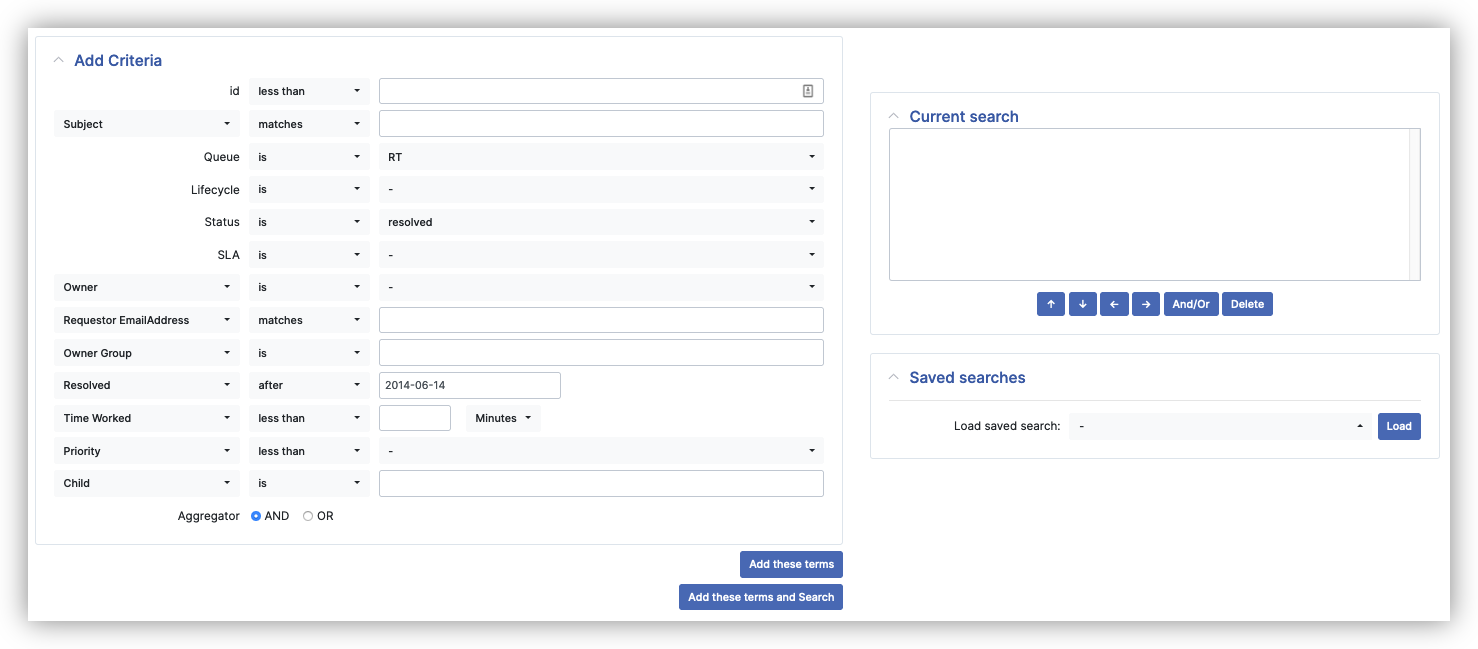
RT also has two meta-statuses, 'active' and 'inactive'. By selecting either of these from the status dropdown of the query builder, your search will include tickets in all active or inactive statuses without adding each individual status name.
The sets of active and inactive statuses for a queue are defined by the associated lifecycle. Active tickets are those listed for the 'active' and 'initial' configurations. Inactive tickets are those defined as 'inactive'. For the default RT lifecycle, for example, the active statuses are new, open, and stalled, and the inactive statuses are resolved, rejected and deleted. See docs/customizing/lifecycles.pod for more information.
After you select some criteria, you can click either Add These Terms to start to build your query.
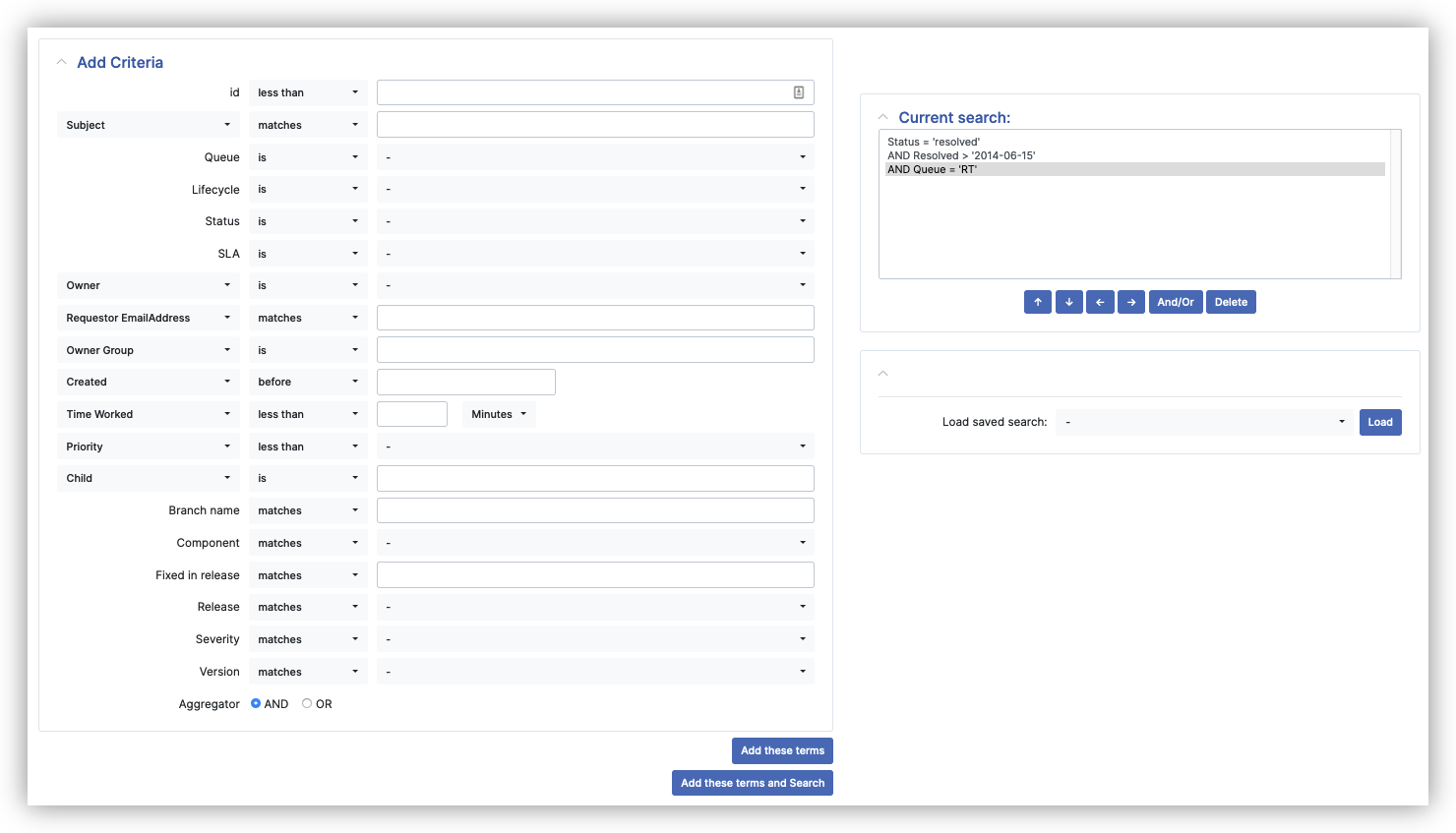
The upper right hand side presents all the logic you have specified. This view is a nice way proofread your search: Have you captured everything you want? Are there things you'd maybe prefer to leave out for now?
You can continue to modify and refine your search, adding or removing criteria. For example, to see all queues and not just the RT queue, you click that part of the query and click Delete.
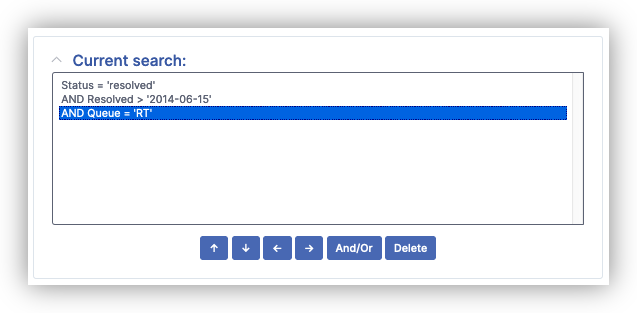
The updated search has just the remaining criteria:
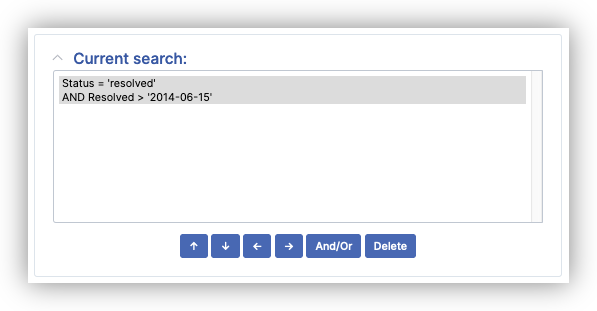
To run the search, click either 'Add these terms and Search', 'Update format and Search' at the very bottom, or Show Results in the submenu near the top.
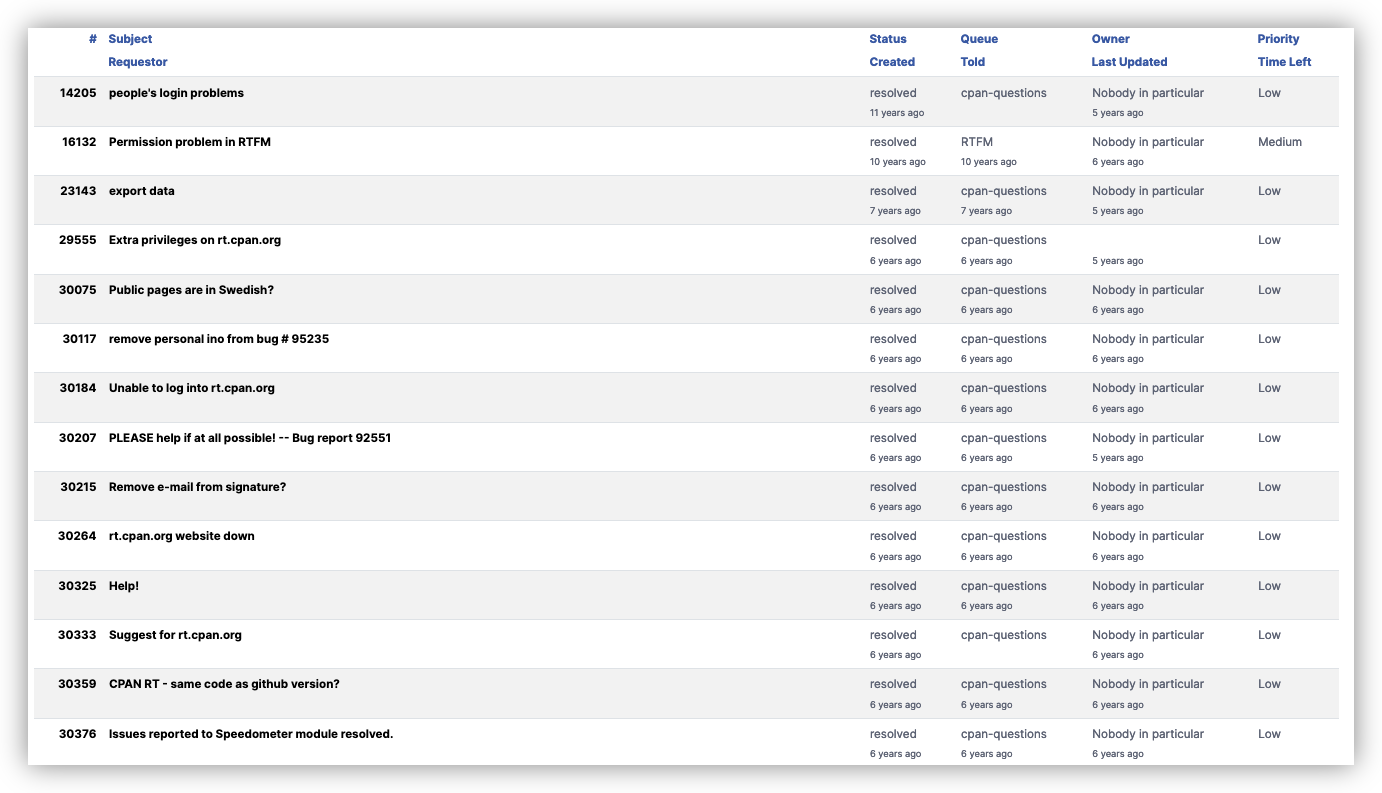
Customizing Search Result Fields
This is the default view of your results. However, like nearly everything in RT, it's configurable. You can select additional columns to appear in your results, eliminate columns you don't find useful, or reorder them. To start, notice that at the bottom of the query builder page there are two panes: Sorting and Display Columns.

There is more than one option for Sorting so that you can break apart tickets with the same search values into a meaningful order. For example, let's say you start off by sorting tickets in a search by their owner. Since you've only specified to sort by owner, RT doesn't order the tickets owned by the same user in a meaningful way. This is where the multiple sort criteria comes in handy. You can use a second sorting criteria to sort within the set of tickets owned by a single user. For example, you could add a sort by due date to see tickets sorted first by owner, and then tickets with the same order are ordered by due date.
The Display Columns tab allows you to add or eliminate information displayed in the results of your search. NEWLINE indicates a line break, or new row, in how the results are displayed. NBSP for adding an empty column (such as what shows up underneath id in the following screenshot).
Here is a search with NEWLINE where it is by default:

Notice that the structure of the data that's displayed is stacked: Subject on top of Requestor, Status on top of Created, etc.. Because we're displaying a lot of information (10 fields for each ticket), having the NEWLINE is important for the results more comprehensible.
Here is that same search but without the NEWLINE:

The same pieces of information are now spread across the display next to one another, which can be harder to read. So when you tell RT to display a lot of columns, it's usually worth adding a well-placed NEWLINE.
Searching for Users on Tickets
The Query Builder provides ways to search for tickets based on how a given user is related to the ticket. This works for all ticket roles, so you can find all active tickets where a given user is the Requestor, meaning they opened the ticket. You can also search for all tickets with a given user as the owner, meaning that's what they are working on.
Groups on Roles
Ticket roles, except for Owner, can also accept a group as a value. When you search for a user, by default the Query Builder does a recursive or "deep" search, meaning it searches the role and it checks the membership of any groups it finds in the role as well.
For example, assume you have a group "Helpdesk", the staff1 user is a member, and Helpdesk is set as an AdminCc on a ticket. If you perform this search:
AdminCc.Name = 'staff1'the results will contain that ticket.
You can also search for group names on roles. For core roles, you can select from the dropdown with group names containing "Owner Group", etc. Following the example above, if you wanted to find tickets with the Helpdesk group assigned to the AdminCc role, you can use this search:
AdminCCGroup = 'Helpdesk'You can also search for groups on custom roles using the Name value. A search for a group on a custom role looks like:
CustomRole.{Department}.Name = 'Helpdesk'Note that if you also have a user with the name 'Helpdesk', the custom role search will return all matches, so you will see tickets with both username 'Helpdesk' and the group 'Helpdesk' assigned.
Shallow Searches
In some cases you may want to see tickets only when the user you are searching for is a direct member of a role and not if they are in any groups. For that case, use the "shallow" options, like "shallow is" to generate a search like this:
AdminCc.Name SHALLOW = 'staff1'That will show tickets where 'staff1' is directly in the AdminCc role, but not the ticket from the previous example where staff1 is in the Helpdesk group on the AdminCc role.
Searching Custom Fields on Tickets
If you use custom fields on your tickets, you might initially load the Query Builder and not see them listed. If your custom fields are applied to individual queues and not globally, they won't show up as options on a new search. However, once you add a queue to your search, as shown above, the custom fields applied to the queue or queues in your search will be displayed. You can then add custom field values to your search just like other fields.
In addition to exact queue name searches like "Queue = 'RT'", the query builder also allows 'LIKE' searches. This can be useful if you have several queues that follow some naming pattern, like "IT Support", "Printer Support", and "Email Support". To include all of these, you can use "Queue LIKE 'Support'".
Using the Advanced tab, you can also type one other criteria to search for queues by their lifecycle. TicketSQL supports "Lifecycle = 'support'" if you type it directly into the Advanced search box.
Basic Custom Field Searches
Once you add a queue to your search using one of the options above, you'll see any custom fields applied to those queues at the bottom of the list of values in the Add Criteria section. To search for all tickets with a custom field that has some value, pick the comparision ("matches", "is", etc.), add a value, and click "Add these terms" to build the search.
If you have a custom field named "Transport Type", for example, that has the values, "Car", "Bus" or "Train", you can search for all tickets that reference cars by picking "is" next to "Transport Type", typing "Car" and clicking Add these terms. You should then see a search term like:
'CF.{Transport Type}' = 'Car'For custom fields that have a dropdown with values to pick from a list, the Query Builder will show the available values as a dropdown and you can pick from the options without typing a value.
When searching for custom fields, you can also add them as a column in your search results as described above.
Searching for Empty Custom Fields
Sometimes you want to search for all tickets where a given custom field doesn't have a particular value. For example, you might search for all tickets where "Transport Type" is not set to "Car" using the "isn't" option, and that would create:
'CF.{Transport Type}' != 'Car'The search would contain all tickets in that queue with "Transport Type" values of "Bus", "Train", and no value.
To remove tickets where Transport Type has no set value, add the following to your query:
AND 'CF.{Transport Type}' IS NOT NULLSimilarly, to see all tickets where "Transport Type" hasn't be set, you can search for :
'CF.{Transport Type}' IS NULLTransaction Query Builder
Similar to the Ticket Query Builder, the Transaction Query Builder provides an interface to search for individual transactions. Transactions are all of the changes made to a ticket through its life. Each of the entries displayed in the ticket history at the bottom of the ticket display page is a transaction.
In some cases, RT users looking for a particular reply on a ticket will search in their email client rather than in RT because they will remenber getting the email with the information they need. On a busy ticket, it can be a challenge to find the reply from Jane some time this week. The Transaction Query Builder now makes that sort of search easy.
Basic Transaction Searches
In the example above, suppose you remember getting a reply from Jane in email on a ticket and you know it was in the last week. But it's been a busy week and Jane is on a bunch of active tickets, so you're not sure where to start. With the Transaction Query Builder, you can easily create a search to show all replies from Jane.
First find Creator, select "is", and type Jane's username. The "Creator" of a transaction is always the person who made the change. For a reply, by email or in RT itself, the person who replied will be the Creator of the transaction.
Next, for Created select "after" and type "1 week ago". RT will then automatically figure out the date 7 days ago and show you only results in the last 7 days.
Finally for Type select "is" and select "Correspond". Correspond is the name RT users internally for all replies on a ticket.
Run the search and you'll see all replies from Jane on any tickets over the last week. Note that you'll see all transactions you have rights to see, even if you aren't a watcher and possibly didn't get an email originally.
Including Ticket Information
When searching for transactions, you can also add criteria about the types of tickets the transactions should be on. In our example, we probably only want to see active tickets, so in the bottom Ticket Fields section you can select Status "is" and "Active". This will then filter out inactive statuses.
Advanced
In addition to the graphical query builder, RT also has an Advanced page where you can write and modify queries and formats directly. For example, you can type the following query directly in the Query box:
Status = 'resolved' AND Resolved > '2019-04-01' AND Queue = 'RT'and then click "Apply" to let RT validate it. RT will display any syntax errors if you make any mistakes so you can fix them.
Valid Search Values
In the above example, search values like 'resolved', '2019-04-01', and 'RT' are all literal search terms: a status, a date, and a string representing the name of a queue. These are all static values that will then return matching tickets. However, sometimes you want to compare 2 columns in RT tables without knowing exact values. This is also supported, for example:
- Search tickets where LastUpdated is after (later than) Resolved
-
LastUpdated > ResolvedThis finds tickets that have been commented on or otherwise updated after they were resolved. Note that
Resolvedis not quoted, indicating that it's the relative date value from a ticket instead of the literal string "Resolved". - Search tickets where the Requestor is also the Owner
-
Requestor.id = Owner - Search tickets where custom fields Foo and Bar have the same value
-
CF.Foo = CF.BarThis is equal to:
CF.{Foo} = CF.{Bar} CF.Foo = CF.Bar.ContentTo compare LargeContent instead:
CF.IP = CF.IPRange.LargeContent
Learn More
To use the query builder to build and save reports, see Dashboard and Reports. For definitions of RT metadata, see Ticket Metadata.
← Back to index